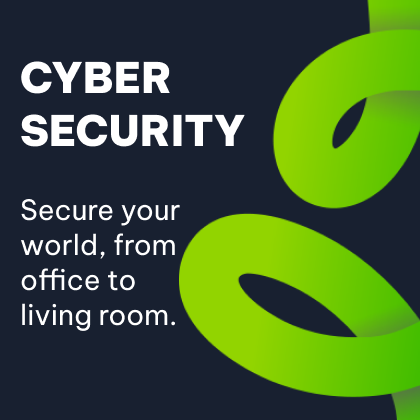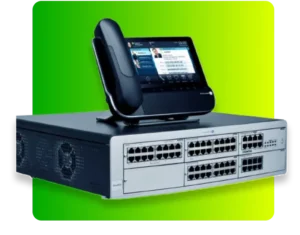Considering the differences between traditional and hosted PBX
Even in today’s digital business world, Voice remains a key element in the overall communications offering, and so it’s important to make the right choice for your company’s telephony requirements. This includes whether to choose traditional on-premises PBX or hosted PBX (in other words, cloud solutions).
Being able to speak to a person – rather than engaging with a chatbot or following text-based or voice-activated instructions – allows both a customer and the organisation’s representative the chance to convey the right tone of voice, which sometimes means the difference between a successful sale or retained customer, or lost possibilities. Talking over the phone can also help to build good customer relationships.
In this article, we consider the differences between traditional PBX and hosted Voice. Both options can provide effective and reliable company phone systems that offer different benefits, and each have pros and cons for different business scenarios.
Before we go into more detail on the different telephony systems, let’s look at different factors to take into consideration.
Questions to Consider for your Business
When it comes to choosing your Voice communications platform, there are many things to factor in, such as the size of your business, existing infrastructure, budget constraints, the number of remote offices, the level of your technical expertise, your tolerance for being dependent on service providers, and more.
And so, when trying to decide between traditional PBX or hosted Voice, you could ask yourself the following questions:
- Budget: How much money is available and what’s your preferred purchasing model?
- Maintenance and upgrades: Does your business require full control of your business phone system or will a managed service model be workable?
- Scalability: Do you foresee significant changes in your number of employees in the future?
- Security and compliance: Are your IT staff capable of maintaining the system?
- Features and futureproofing: Does the system of choice offer modern features, or can it adapt to emerging technologies to ensure long-term relevance?
Bearing these issues in mind, we next discuss on-site (traditional) PBX versus hosted PBX options.
On-site PBX: Where It All Began
Private Branch Exchange (PBX) has been used for decades between employees and customers, with the PBX hardware installed on-site. The business purchases and owns the phone system hardware, networking and server equipment, and your IT staff take care of all the updates and maintenance regarding the system. The calls are routed through traditional phone lines as well as SIP trunking[1].
- Budget: On-premises PBX systems usually require a higher initial investment in equipment and installation costs, and maintenance and upgrades will also need to have costs factored in.
- Maintenance and upgrades: On-premises PBX systems require on-site technical support. This can lead to operational disruptions and additional labour and parts fees.
- Scalability: Expanding an on-premises PBX can often require physical hardware or licensing additions, which could lead to incompatibility issues between the current PBX version and the latest software updates, resulting in costly, unplanned upgrades or system downtime.
- Security and compliance: On-premises PBX systems allow companies to directly manage the security policies of their hardware but are more susceptible to data breaches if these policies are not managed correctly. This includes risks from outdated software and weak passwords. On-premises PBXs also require physical security measures to protect them from unauthorised access. This would include secure rooms, surveillance and restricted access, which in turn could be more costly and complex to manage.
Key takeaways: On-premises PBX systems can be more suitable for larger corporations with big budgets and space to host the physical hardware, as well as having the resources to manage and maintain the system. Housing the PBX system on-site brings an organisation maximum control over business communications, which might be a better fit for companies with complex and / or secure communication needs.
Hosted PBX
A Hosted PBX solution is a telephony solution where the PBX infrastructure is hosted in the service provider’s Cloud or network. Instead of using traditional phone lines, it relies on internet connectivity, more commonly known as VoIP (Voice Over Internet Protocol).
- Budget: Cloud PBX generally involves a lower initial setup cost because it needs minimal physical infrastructure. Due to economies of scale, providers can offer Cloud PBX services at a nominal monthly fee, making it cost-effective for businesses with limited capital, and easy to budget for with a predictable monthly fee. A reliable Internet connection is a critical core cost factor.
- Maintenance and upgrades: A cloud-based PBX system is maintained and upgraded by the service provider, and this remote management makes sure your cloud solution is always up to date with the latest features and security patches, with minimal downtime for the business.
- Scalability: A hosted PBX solution allows businesses to add or remove services as needed, providing greater flexibility and cost savings without software compatibility issues or platform limitations.
- Security and compliance: With cloud PBX solutions, it’s the responsibility of the vendor to ensure that the systems adhere to the latest security standards and compliance regulations, including the Protection of Personal Information (POPI) Act. Most cloud PBX providers implement advanced security measures to protect the data and prevent intrusions.
- Redundancy: With the PBX in the cloud, a reputable vendor will implement multiple layers of redundancy, which are not available with on-site PBX systems. These include platform replication across geographically distributed data centres, redundant network paths between data centres, automatic failover mechanisms, and continuous system monitoring to aid in ensuring high availability and minimising the risk of service disruption.
Key takeaways: Due to ongoing advancements in Cloud technology, Cloud PBXs offer more advanced features than traditional PBXs, without the complexity of on-site installation and maintenance. They provide higher cost savings, minimal hardware requirements, and a wide range of useful functionalities. Cloud phone systems also allow your employees to work remotely, enabling employees to stay connected from anywhere they have internet access.
Your Business Communications and Vox
When it comes to the choice between traditional on-premises versus cloud PBX systems, there are many things to factor in, such as the size of your business, your organisation’s technical expertise levels, the number of remote offices, your preference for in-house or managed service providers, and more.
Whatever your preferences and requirements, Vox has a solution geared to assist your company, and its present and future needs. We look forward to hearing from you for more information on choosing the best PBX offering for your organisation.
[1] Session Initiation Protocol (SIP) trunking is a digital method of making and receiving phone calls and other digital communication over an Internet connection.


















